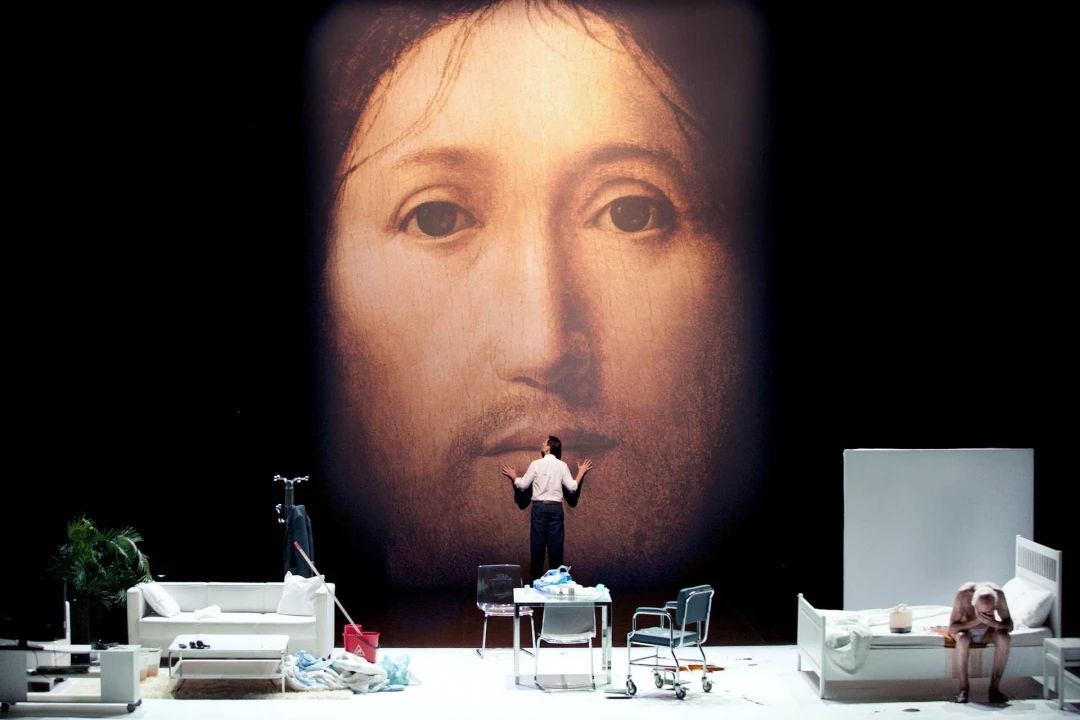Over the past 15 years or so, visionary director Romeo Castellucci has blossomed into a star of Europe's theater festivals and prestigious institutions with largely plotless, large-scale shows that operate at a dizzyingly high conceptual and technical level, and are so abstract that they become strangely accessible (you can project anything onto those inscrutable canvases).
Yet Castellucci and his company, Societas Raffaello Sanzio , are largely unknown in the US. "On the Concept of the Face, Regarding the Son of God" is only the third show of his to make it to the tri-state area. This American premiere is playing at Montclair State U's Kasser Theater , like the previous two, until tomorrow evening and it's a must-see for anybody interested in boundary-pushing theater. Whatever you think of his work, there's no denying that Castellucci's commitment is absolute.
When I saw "On the Concept" last night, I couldn't help but think that whatever entertainment is, this was the exact opposite. And yet I was enthralled -- unlike the Montclair students around me, at least a couple of whom IM'ed on phones and iPads the entire time. I find their manners to be wretched, but their lazy disdain makes sense: The piece goes against everything they're familiar with, both in terms of content and aesthetics.
For starters, a huge part of the show looks bluntly at the indignity of aging -- not an easy sell in a country where the only options for older people in popular culture are grumpy old men, comic relief à la Betty White or benevolent dispensers of quaint wisdom. (Supposedly hipper fare ignores them entirely, which isn't much better.)
"On the Concept" begins with a frail, elderly man (Gianni Piazzi), wearing a flimsy hospital-like gown over what we realize is adult diapers. He's watching TV with headphones while his adult son (Sergio Scarlatella) potters around the modernist white house before going to work. Suddenly the father loses controls of his bowels. The son lovingly, patiently cleans up his naked dad, who's sobbing in confusion and humiliation. The older man does it again; the son washes him up a second time. Another bout of diarrhea. "Papa!" the son cries in exasperation. (The show is in Italian with no subtitles, but there's a translation of the sparse dialogue in the program). He cleans up his shaking, whimpering father yet again and puts him to bed -- which is white, like the rest of the furniture, in stark contrast to the many foul-looking smears and sluices.
This unfurls at a deliberate, agonizingly slow pace -- another strike for the youngsters -- while the huge face of Christ, from a Renaissance painting by Antonello da Messina , looms over the stage, staring at us. It's all relentless, and very hard to take. We are confronted with the misery at the end of life, juxtaposed with striking images of compassion steeped in Catholic faith.
After the third clean-up, the son, in despair, pulls up against the painting. The words "Gesù, Gesù" swell up.
Abruptly, things pick up. Scott Gibbons' industrial score rises in volume -- sound design plays a huge role in Castellucci shows, and once again it doesn't disappoint, crisply loud and ominous. Several children (cast locally) enter, carrying backpacks from which they pull stones/hand grenades, which they throw at the face of Christ. The sound is amplified to the point that it feels as if we're now in a war zone.
Now bathed in semi-darkness, the face of Christ is reminding me of the Shroud of Turin . Then it starts quivering and heaving, as if pushed from the inside out. The sound gets ever louder. Brownish-black liquids trickle through the pulsating face. It looks like what was leaking out of the older man earlier -- which may explain why the show was picketed by fundamentalist Catholic groups in France.
The face disintegrates, and the words "You Are My Shepherd" appear, lit up like neon. Another word: "Not," positioned so that the sign looks like "You Are Not My Shepherd." The end. Mild applause from the stunned audience.
The thing with Castellucci shows is that no matter how hard to watch they are, you never get the feeling these are just shock tactics. Rather, the audience is put a state of anxious, uncomfortable vulnerability as it's forced to consider primal fears.
It feels odd to recommend a show by saying "Go! It'll make you really uncomfortable!" but there you have it: Go! It'll make you really uncomfortable!
by Elisabeth Vincentelli - The New York Post



